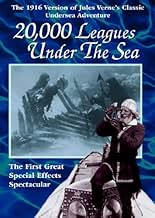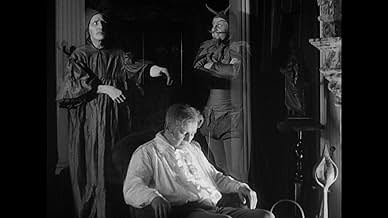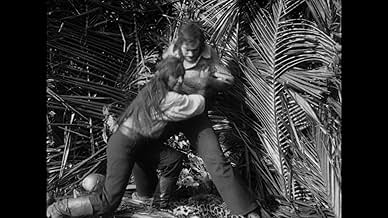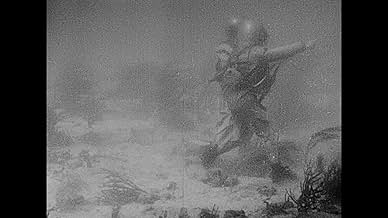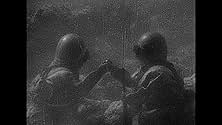PUNTUACIÓN EN IMDb
6,1/10
2,1 mil
TU PUNTUACIÓN
Añade un argumento en tu idiomaA French professor and his daughter accompany Captain Nemo on an adventure aboard a submarine.A French professor and his daughter accompany Captain Nemo on an adventure aboard a submarine.A French professor and his daughter accompany Captain Nemo on an adventure aboard a submarine.
- Dirección
- Guión
- Reparto principal
- Premios
- 1 premio en total
William Welsh
- Charles Denver
- (as William Welch)
Wallis Clark
- Pencroft
- (as Wallace Clark)
Joseph W. Girard
- Maj. Cameron
- (sin acreditar)
Ole Jansen
- Undetermined Secondary Role
- (sin acreditar)
Noble Johnson
- Undetermined Secondary Role
- (sin acreditar)
Leviticus Jones
- Neb
- (sin acreditar)
Martin Murphy
- Herbert Brown
- (sin acreditar)
Jack Tornek
- Undetermined Secondary Role
- (sin acreditar)
Reseñas destacadas
This film combines plot elements of Verne's original 20,000 Leagues Under the Sea and Mysterious Island, then adds its own subplot involving the origin of Captain Nemo that ties everything together. I was very impressed by the writing. This was the first major film with underwater photography. The set design was impressive. I found the diving suits to be particularly interesting--essentially early versions of scuba gear. The new score fit very well into the story. All in all, a wonderful and landmark achievement in filmmaking.
When I read during the opening credits of the 1916 adaptation of Jules Verne's "20,000 Leagues Under the Sea," immediately I assumed the frame of mind that I always do when watching early films, so as not to criticize it's lack of special effects or advanced film techniques. Immediately I was immensely impressed at the transfer from book to film, as the film followed the story closely and faithfully.
Unfortunately, this only lasted for about the first ten minutes of the film, which ultimately proved to take Verne's work and butcher it in every way imaginable. Probably the most jarring change to the story is that they decided to not only adapt 20,00 Leagues, but also another Verne novel, Mysterious Island, into this film. So the result is that you have two totally different stories taking place that don't at all seem to fit together, until finally they come together in the bizarre conclusion, which makes absolutely no sense in respect to the novel.
My current theory is that because so much of the original novel of 20,000 Leagues was decades beyond the reach of the filmmakers to be able to put on screen, so they probably had to look to an entirely separate novel just to have enough material to fill a full length film. Sadly, it reminds me of those terrible songs that radio stations sometimes come up with when they combine two popular songs together that have a similar beat, resulting in something that is not quite equal to but definitely less than the originals. One such bizarre hybrid comes to mind involving Closer, by Nine Inch Nails, and Garbage's #1 Crush.
The basic, basic, basic plot structure remains, but literally 95% of the story is gone. There is rumor of a massive sea monster and the crew of the Abraham Lincoln set off to capture it. Strangely enough, at one point it passes a mere few meters from their ship in broad daylight, and the crew can clearly see the steel plated sides and the rivets holding it together, even the bridge and periscope, and yet they still think it's a sea monster.
I'll attribute that to the inability to emulate the Nautilus's movements as described in the novel, but in this way we also have to sacrifice the entirety of the ship's glorious design and function, which is not even described in dialogue. For the most part, we see a single room, which looks like an old Victorian bedroom with one wall that looks like it belongs in a boiler room.
Probably the worst crime that the film commits is in the character of Captain Nemo. Granted, Nemo in the novel is not exactly the most charming and charismatic man, but it is as if they set out in this film to create a man as far from the original description as humanly possible. As a result, we get a bizarre spectacle that looks like a disgruntled Santa Clause in blackface. And not only that, throughout the film he gives several displays of compassion that the original Nemo would have scoffed at. Indeed, at one point, he torpedoes a ship, and then afterwards and then almost faints as he worries about the safety of the victims. What the hell?? And incidentally, Verne's Nautilus didn't have torpedoes, although he did use it as a ramming weapon.
In the film's defense, the underwater photography is truly impressive given the time that it was filmed, and surely knocked 1916 audiences, most of whom had probably never seen the underwater world, out of their seats. This would certainly explain the seemingly endless lingering on these scenes. Their is also an interesting allusion to another Verne novel, as at one point in their underwater tour they come across a decayed shipwreck, which Nemo describes as "the wreck of an old blockade runner."
And the worst thing about the bizarre personification of Nemo in this film is the backstory that was invented for the film which, amazingly, is introduced with this intertitle -
"Captain Nemo reveals the tragic secret of his life, which Jules Verne never told."
What follows is the most bizarre story imaginable, which claims that Nemo was previously some kind of empirical royalty who lived in an empire "beyond the sea." One man wrongs him, which doesn't explain his subsequent disdain, and even hatred, for all of mankind of all nations, nor does anything explain why he took to the sea. And incidentally, Nemo is a man of art, science, biology, history, astronomy, etc. The transition from his old life to the one we see is totally senseless.
It may very well be that this was one of the first major films to set the trend of adapting novels to film, and while modern adaptations still make ridiculous changes to story and characters where they don't belong, at least those inexplicable liberties seem to have diminished since 1916!
Unfortunately, this only lasted for about the first ten minutes of the film, which ultimately proved to take Verne's work and butcher it in every way imaginable. Probably the most jarring change to the story is that they decided to not only adapt 20,00 Leagues, but also another Verne novel, Mysterious Island, into this film. So the result is that you have two totally different stories taking place that don't at all seem to fit together, until finally they come together in the bizarre conclusion, which makes absolutely no sense in respect to the novel.
My current theory is that because so much of the original novel of 20,000 Leagues was decades beyond the reach of the filmmakers to be able to put on screen, so they probably had to look to an entirely separate novel just to have enough material to fill a full length film. Sadly, it reminds me of those terrible songs that radio stations sometimes come up with when they combine two popular songs together that have a similar beat, resulting in something that is not quite equal to but definitely less than the originals. One such bizarre hybrid comes to mind involving Closer, by Nine Inch Nails, and Garbage's #1 Crush.
The basic, basic, basic plot structure remains, but literally 95% of the story is gone. There is rumor of a massive sea monster and the crew of the Abraham Lincoln set off to capture it. Strangely enough, at one point it passes a mere few meters from their ship in broad daylight, and the crew can clearly see the steel plated sides and the rivets holding it together, even the bridge and periscope, and yet they still think it's a sea monster.
I'll attribute that to the inability to emulate the Nautilus's movements as described in the novel, but in this way we also have to sacrifice the entirety of the ship's glorious design and function, which is not even described in dialogue. For the most part, we see a single room, which looks like an old Victorian bedroom with one wall that looks like it belongs in a boiler room.
Probably the worst crime that the film commits is in the character of Captain Nemo. Granted, Nemo in the novel is not exactly the most charming and charismatic man, but it is as if they set out in this film to create a man as far from the original description as humanly possible. As a result, we get a bizarre spectacle that looks like a disgruntled Santa Clause in blackface. And not only that, throughout the film he gives several displays of compassion that the original Nemo would have scoffed at. Indeed, at one point, he torpedoes a ship, and then afterwards and then almost faints as he worries about the safety of the victims. What the hell?? And incidentally, Verne's Nautilus didn't have torpedoes, although he did use it as a ramming weapon.
In the film's defense, the underwater photography is truly impressive given the time that it was filmed, and surely knocked 1916 audiences, most of whom had probably never seen the underwater world, out of their seats. This would certainly explain the seemingly endless lingering on these scenes. Their is also an interesting allusion to another Verne novel, as at one point in their underwater tour they come across a decayed shipwreck, which Nemo describes as "the wreck of an old blockade runner."
And the worst thing about the bizarre personification of Nemo in this film is the backstory that was invented for the film which, amazingly, is introduced with this intertitle -
"Captain Nemo reveals the tragic secret of his life, which Jules Verne never told."
What follows is the most bizarre story imaginable, which claims that Nemo was previously some kind of empirical royalty who lived in an empire "beyond the sea." One man wrongs him, which doesn't explain his subsequent disdain, and even hatred, for all of mankind of all nations, nor does anything explain why he took to the sea. And incidentally, Nemo is a man of art, science, biology, history, astronomy, etc. The transition from his old life to the one we see is totally senseless.
It may very well be that this was one of the first major films to set the trend of adapting novels to film, and while modern adaptations still make ridiculous changes to story and characters where they don't belong, at least those inexplicable liberties seem to have diminished since 1916!
This early adaptation of "20,000 Leagues Under the Sea" is interesting, and generally entertaining, though it lacks the depth of the original story. Its strengths are the underwater effects, the settings, and the camera work, which at times are remarkable for the era. On the other hand, it makes little attempt to convey the most important themes of Verne's story, settling instead for straightforward adventure and melodrama, which are much easier to film.
One can only guess how exciting it might have been in 1916 to see some of these images and special effects. Only occasionally does it falter a bit and lose the illusion of reality for a short time; otherwise it is quite convincing. Just seeing the underwater photography alone must have been pretty impressive at the time, and they also managed to get some interesting sea creatures on film. The photography itself is pretty good throughout the movie, and some of the props and settings are nicely done.
The story draws rather freely both from "20,000 Leagues ... " and also from another Verne story, "Mysterious Island". It is a mostly entertaining yarn, full of action and with some unexpected developments. But only a small portion of Verne's scientific vision comes across, and none of the depth of the characters and of their interactions has been preserved. Captain Nemo is one of literature's more complex and thought-provoking characters, but here he becomes more of a stock melodrama figure. Professor Arronax and Ned Land are mostly spectators, rather than providing worthy foils for the mad genius Nemo.
It's by no means a bad movie, and if you are a silent film fan and/or are interested in film history, there should be enough here to make it worth watching. But otherwise, the 1950's Disney version does a much better job of filming the profound vision and philosophical conflict found in Verne's original novel.
One can only guess how exciting it might have been in 1916 to see some of these images and special effects. Only occasionally does it falter a bit and lose the illusion of reality for a short time; otherwise it is quite convincing. Just seeing the underwater photography alone must have been pretty impressive at the time, and they also managed to get some interesting sea creatures on film. The photography itself is pretty good throughout the movie, and some of the props and settings are nicely done.
The story draws rather freely both from "20,000 Leagues ... " and also from another Verne story, "Mysterious Island". It is a mostly entertaining yarn, full of action and with some unexpected developments. But only a small portion of Verne's scientific vision comes across, and none of the depth of the characters and of their interactions has been preserved. Captain Nemo is one of literature's more complex and thought-provoking characters, but here he becomes more of a stock melodrama figure. Professor Arronax and Ned Land are mostly spectators, rather than providing worthy foils for the mad genius Nemo.
It's by no means a bad movie, and if you are a silent film fan and/or are interested in film history, there should be enough here to make it worth watching. But otherwise, the 1950's Disney version does a much better job of filming the profound vision and philosophical conflict found in Verne's original novel.
Underwater films are as popular today as ever in movie theaters. These motion pictures lend even the most of us landlubbers an idea how the ocean underneath the waves looks. The first feature movie to contain underwater footage is December 1916's "20,000 Leagues Under The Sea." This Jules Verne-based picture was the cinematic debut of screening submerged film footage, showing divers, a fake octopus, fish, including sharks and seabed scenery to amaze viewers back at a time when no one had ever seen under-the-ocean moving images before.
Brothers George and J. Ernest Williamson in 1914 made their experimental film, "Terrors of the Deep," also named "Thirty Leagues Under The Sea," using their newly-invented camera containing reflector mirrors running down a long tube to shoot underwater footage in the clear, relatively shallow waters of the Bahamas. An illuminating light next to the tube's lower end allowed the film to capture a moving world where no motion picture crew had been able to photograph before. The brothers promised investors who had put money into the project they would show a diver killing a shark. To make that happened, they dangled a dead horse over the side of their boat to attrack the predators. It worked.
Universal FIlm Company loved the Williamson film so much they made plans to base the underwater footage the brothers were assigned to shoot around an 1870 Jules Verne book, "20,000 Leagues Under The Sea," with director/actor Stuart Paton playing Captain Nemo. Actually, the movie was the merging of two Verne novels, "Leagues" and "The Mysterious Island."
The Williamsons returned to the Bahamas to shot scenes dictated by the script. Disney's 1954 film crew for its "20,000 Leagues Under The Sea" returned to the same spot in the Bahamas to shoot its underwater footage. The sprawling 1916 film was expensive to make in its two-year production, which included a flashback sequence towards the end employing hundreds of extras amidst elaborate India-style sets. The movie, although extremely popular, never produced a profit, discouraging Hollywood from making another Verne film for 12 years until ironically the part-talkie, two-color Technicolor MGM's "The Mysterious Island" was released in 1929.
Brothers George and J. Ernest Williamson in 1914 made their experimental film, "Terrors of the Deep," also named "Thirty Leagues Under The Sea," using their newly-invented camera containing reflector mirrors running down a long tube to shoot underwater footage in the clear, relatively shallow waters of the Bahamas. An illuminating light next to the tube's lower end allowed the film to capture a moving world where no motion picture crew had been able to photograph before. The brothers promised investors who had put money into the project they would show a diver killing a shark. To make that happened, they dangled a dead horse over the side of their boat to attrack the predators. It worked.
Universal FIlm Company loved the Williamson film so much they made plans to base the underwater footage the brothers were assigned to shoot around an 1870 Jules Verne book, "20,000 Leagues Under The Sea," with director/actor Stuart Paton playing Captain Nemo. Actually, the movie was the merging of two Verne novels, "Leagues" and "The Mysterious Island."
The Williamsons returned to the Bahamas to shot scenes dictated by the script. Disney's 1954 film crew for its "20,000 Leagues Under The Sea" returned to the same spot in the Bahamas to shoot its underwater footage. The sprawling 1916 film was expensive to make in its two-year production, which included a flashback sequence towards the end employing hundreds of extras amidst elaborate India-style sets. The movie, although extremely popular, never produced a profit, discouraging Hollywood from making another Verne film for 12 years until ironically the part-talkie, two-color Technicolor MGM's "The Mysterious Island" was released in 1929.
First retelling based on Jules Verne's fantasy-adventure novel with unknown cast and extraordinary scenarios . Silent take on for cinema , filmed in on location in Bahamas . When Jules Verne wrote this famed novel , the startling inventions impressed the world as being the limit of imagination and impossibility . The scenes were made possible by the Williamson Brothers inventions with submarine photoplay ever filmed . The film talks about the known story from Jules Verne novel , a real masterpiece ; 1868 ,the oceans are no longer safe , many ships have been lost, the sailors have returned to New England's fishing port with tales of vicious giant whale with long horn . The naturist and biologist expert named professor Pierre Aronnax and his daughter undertake a dangerous mission . Aronnax , his daughter , along with a professional whaler and famous harpoonist named Ned Land join forces in an expedition commanded by captain Farragut that attempt to unravel the mysterious sinking ships by an unknown creature . Aboard the ship called USS Abrahan Lincoln , they go out to investigate . At sea, Professor Aronnax was aboard the ship when Nautilus rammed it and threw the Professor, his helper and Ned Land into the water . They are captured and get thoroughly involved with power-hungry captain Nemo (Allen Hollubar, being in Disney version masterfully played by James Mason) and take an extraordinary adventure underseas in an advanced submarine called Nautilus . Prisoners at first, they are now treated as guests to view the underwater world and to hunt under the waves. Nemo will also tells them about the riveting submarine of the future and the revenge that has driven him for all these years . Our heroes get stuck in the ship , undergoing numerous adventures and suffering innumerable perils .
Exciting and thrilling submarine movie dealing with the Nautilus captained by Nemo , rendition from ¨20,000 Leagues¨, but also another Verne novel, ¨Mysterious Island¨, so the result is that there are two diverse tales taking place which don't at all seem to fit together, until ultimately they come together in the strange conclusion, which makes little relation in respect to the original classic . It displays sensational adventures , drama , marvelous scenarios and is enjoyable but dated . This film became famous for its groundbreaking work in actual underwater photography by George M. Williamson and J. Ernest Williamson who alone had solved the secret under-water sea photography . The actual undersea footage was shot in the Bahamas due to the unusually clear water . When this film was remade by Walt Disney 38 years later, they came to this same spot for their undersea footage . Fascinating submarine movie blends action , disaster spectacle, hokey fun , suspense and emotional happenings . Surprise-filled entertainment and with plenty of action on grand scale with breathtaking special effects by that time and some ships and submarine by maquette or scale model and filmed in Leonia, New Jersey, Universal Studios , Universal City, California, and New Providence Island, Bahamas . The underwater scenes , sea animals , flamboyant FX to make large-size Octopus seem like horrible monster , all of them are spectacular and the film is an early Hollywood product . However , a confuse plot and overlong runtime became a little boring film . This vintage story was regularly directed by Stuart Paton , it results to be an old mute (1916) with archaeological interest . The motion picture will appeal to fantasy-adventure buffs and silent movie aficionados .
The best adaptation turns out to be the Walt Disney production (1954) , marvelously directed by Richard Fleischer , James Mason plays a serious revenger captain Nemo ; Paul Lukas plays perfectly Annorax as intelligent scientific ; and Ned Land played by Kirk Douglas as a stubborn sailor who spends most of their time devising intelligent ways for escape . Other versions from this unforgettable novel are the following : for TV (1997) directed by Rod Hardy with Michael Caine , Mia Sara and Patrick Dempsey ; and another Television film (1997) directed by Michael Anderson with Ben Cross and Richard Crenna ; furthermore a cartoon movie directed by Arthur Rankin.
Exciting and thrilling submarine movie dealing with the Nautilus captained by Nemo , rendition from ¨20,000 Leagues¨, but also another Verne novel, ¨Mysterious Island¨, so the result is that there are two diverse tales taking place which don't at all seem to fit together, until ultimately they come together in the strange conclusion, which makes little relation in respect to the original classic . It displays sensational adventures , drama , marvelous scenarios and is enjoyable but dated . This film became famous for its groundbreaking work in actual underwater photography by George M. Williamson and J. Ernest Williamson who alone had solved the secret under-water sea photography . The actual undersea footage was shot in the Bahamas due to the unusually clear water . When this film was remade by Walt Disney 38 years later, they came to this same spot for their undersea footage . Fascinating submarine movie blends action , disaster spectacle, hokey fun , suspense and emotional happenings . Surprise-filled entertainment and with plenty of action on grand scale with breathtaking special effects by that time and some ships and submarine by maquette or scale model and filmed in Leonia, New Jersey, Universal Studios , Universal City, California, and New Providence Island, Bahamas . The underwater scenes , sea animals , flamboyant FX to make large-size Octopus seem like horrible monster , all of them are spectacular and the film is an early Hollywood product . However , a confuse plot and overlong runtime became a little boring film . This vintage story was regularly directed by Stuart Paton , it results to be an old mute (1916) with archaeological interest . The motion picture will appeal to fantasy-adventure buffs and silent movie aficionados .
The best adaptation turns out to be the Walt Disney production (1954) , marvelously directed by Richard Fleischer , James Mason plays a serious revenger captain Nemo ; Paul Lukas plays perfectly Annorax as intelligent scientific ; and Ned Land played by Kirk Douglas as a stubborn sailor who spends most of their time devising intelligent ways for escape . Other versions from this unforgettable novel are the following : for TV (1997) directed by Rod Hardy with Michael Caine , Mia Sara and Patrick Dempsey ; and another Television film (1997) directed by Michael Anderson with Ben Cross and Richard Crenna ; furthermore a cartoon movie directed by Arthur Rankin.
¿Sabías que...?
- CuriosidadesUnderwater cameras were not used. The Williamson brothers had developed a system of watertight tubes and mirrors, like an upside-down periscope, and were dependent on the clarity of water and sunshine to provide the necessary light.
- PifiasIn one scene on the island the balloon survivors are at a table and a black servant appears. He never shows up again and is not rescued at the end of the film with the rest of the survivors.
- Citas
Capt. Nemo: I am Captain Nemo and this is my submarine, 'Nautilus'... It has pleased me to save your lives... You are my prisoners.
- Créditos adicionalesThe opening titles announce "The First Submarine Photoplay Ever Filmed".
- Versiones alternativasKino International released a video with a music soundtrack by Alexander Rannie and Brian Benison (music © 1991). Running time is 101 minutes.
- ConexionesFeatured in Hollywood Aliens & Monsters (1997)
Selecciones populares
Inicia sesión para calificar y añadir a tu lista para recibir recomendaciones personalizadas
- How long is 20,000 Leagues Under the Sea?Con tecnología de Alexa
Detalles
- Fecha de lanzamiento
- País de origen
- Idioma
- Títulos en diferentes países
- 20,000 Leagues Under the Sea
- Localizaciones del rodaje
- Empresa productora
- Ver más compañías en los créditos en IMDbPro
Taquilla
- Presupuesto
- 200.000 US$ (estimación)
- Duración1 hora 25 minutos
- Mezcla de sonido
- Relación de aspecto
- 1.33 : 1
Contribuir a esta página
Sugerir un cambio o añadir el contenido que falta

Principal laguna de datos
By what name was 20.000 Leguas de viaje submarino (1916) officially released in India in English?
Responde
